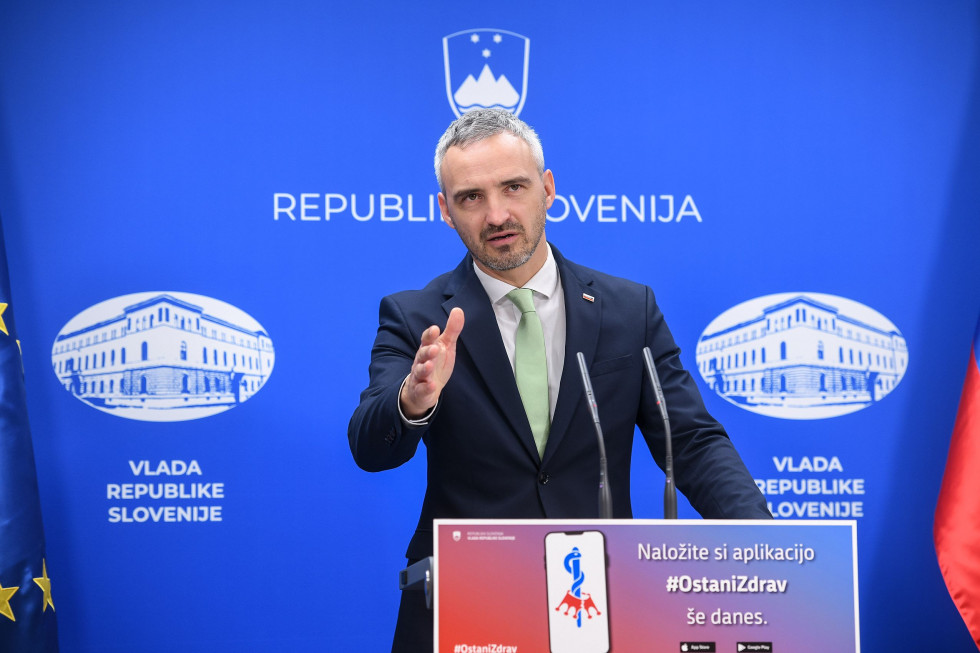5th package of anti-corona measures focused on the labour market and health sector
In its meeting the Government discussed and confirmed the draft act known as the 5th anti-corona package. It reflects the current economic forecasts, which are more optimistic than those in the spring, yet at the same time it recognises that the uncontrolled spread of the virus could have negative consequences for the economy. A fair copy of the act is already being drawn up for 28 September, when minor amendments will still be possible.
Extended wait for work, help for self-employed
At the press conference, Minister Cigler Kralj highlighted the key steps envisaged in the new package of anti-corona measures. In order to preserve jobs and help PKP5 employers, he envisages an extension of the measure of waiting for work at home up until the end of 2020 for all sectors, the condition being a decline in revenue of at least 30 per cent relative to 2019.
Starting on 1 September, the act provides the possibility of claiming 80 per cent compensation in the case of absence from work to care for a child due to circumstances beyond one’s control, i.e. if they were ordered to quarantine. For employees there is an extension of the measure of 100 per cent wage compensation in the event of quarantine being ordered due to contact with an infected person at the workplace.
Self-employed persons will be entitled to reimbursement compensation of EUR 250 if they have been ordered to quarantine. The measure will apply from 1 October. For self-employed persons and micro-companies there is a renewed imposition of temporary measures in the form of a monthly basic income in the amount of EUR 700 and reimbursement of contributions in the amount of EUR 400 monthly.
Supplements for staff in social protection and healthcare institutions
The proposed act also introduces the possibility of temporary deployment of employees in social protection and healthcare institutions to old people’s homes.
For employees who work directly with infected people in grey and red zones within social protection institutions, there is a proposed supplement in the amount of 30 per cent of the hourly rate of basic pay for the employee. Equally, supplements are also envisaged for healthcare workers who work with Covid patients.
In order to ensure the financial sustainability of old people’s homes, the Government proposes the introduction of measures to finance protective equipment to contain the spread of Covid-19, and covering the costs of loss of revenue due to unoccupied capacities, since homes with confirmed cases of the virus cannot accept new residents.
As for measures in the healthcare sector, there will be the possibility of taking absences from work of up to three working days due to illness, without a note from one’s personal physician. The procedure for issuing quarantine decisions has also been simplified.
Financing PPE for educational institutions
In the education sector, financing is being provided for personal protective equipment and for means of disinfecting spaces, along with exemption from payment for nursery school in the event of a child being ordered to quarantine. The option of performing educational work remotely is also arranged.
Expense reimbursement for occasional transport providers
In order to help those providing occasional transport and urban transport, the Government proposal ensures compensation for expenses they incurred between 16 March and 11 May (under the declared epidemic), when they could not provide transport. There is also a proposal for drivers to be compensated for the cost of protective equipment and of means for disinfecting vehicles.
Epidemiological situation in Slovenia
On Wednesday, a total of 2,848 tests were conducted in Slovenia, of which 122 were positive, which is just over 4 per cent, explained the deputy head of the Centre for Infectious Diseases, Nuška Čakš Jager. Hospitals are caring for 63 patients with Covid-19, with 13 of them requiring intensive care. On Wednesday, two patients died, both of them from old people’s homes (Maribor and Rogaška Slatina). There were 24 new infections in Ljubljana, and 8 in the municipalities of Maribor, Domžale and Črna na Koroškem. She also added that private events remain the most common source of infection.


